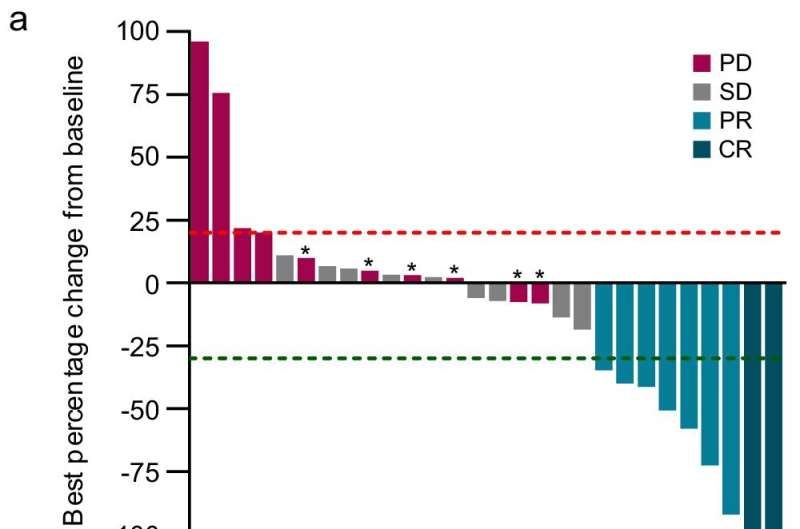
A drug that targets a protein known as phosphatidylserine boosted the response rate for hepatocellular carcinoma (HCC) patients receiving immunotherapy without compromising their safety, according to results of a phase two clinical trial conducted by UT Southwestern Medical Center.
The findings, published in Nature Communications, show the potential benefits of augmenting immunotherapy for this and other forms of cancer.
“This study shows the promise of improving the success of cancer immunotherapies by targeting other immunomodulating proteins simultaneously,” said study leader David Hsieh, M.D., Assistant Professor of Internal Medicine in the Division of Hematology and Oncology and a member of the Experimental Therapeutics Research Program of the Harold C. Simmons Comprehensive Cancer Center at UT Southwestern.
HCC is the most common form of liver cancer and the fourth most frequent cause of cancer-related deaths worldwide. For many years, the only existing treatment for tumors of this kind that can’t be surgically removed was a drug called sorafenib. It works by slowing the growth of tumor-feeding blood vessels.
Although this targeted therapy drug was groundbreaking when it was approved by the U.S. Food and Drug Administration in 2007, it extends survival by only a few months.
More recently, immunotherapies—treatments that spur the immune system to fight tumors—have emerged as the most effective treatments for HCC patients. However, only a fraction of patients responded to these drugs when delivered alone, and combining multiple immunotherapies increased the likelihood of serious and occasionally deadly side effects.
Several years ago, researchers discovered that phosphatidylserine, a fatty substance called a phospholipid sometimes present on the surface of cancer cells, appeared to interact with immune cells to prevent them from attacking tumors. An antibody drug called bavituximab that neutralizes phosphatidylserine showed no effect on tumor response, progression, or survival when administered alone across multiple cancer types or when combined with sorafenib in HCC. But bavituximab had never been tested in combination with immunotherapy agents.
Toward that end, Dr. Hsieh and his colleagues recruited 28 patients with HCC receiving care at UT Southwestern and Parkland Health. These patients, whose cancers couldn’t be surgically removed, received imaging of their tumors at the start of the study. They then received a combination of bavituximab and pembrolizumab, an immunotherapy drug approved in 2016 to treat various cancers.
While receiving both therapies, these patients had periodic imaging to determine whether their tumors shrank, stopped growing, or continued to grow and multiply. The researchers followed these patients for an average of 28.5 months.
Although previous clinical trials had shown that only about 16% of HCC patients responded to pembrolizumab alone, nine patients, or 32%, responded to the combined therapy. Two of them had a complete response, with no evidence of disease on imaging at the end of the trial. The combined therapy halted progression in another 32% of patients. For responders, the two drugs continued to shrink their tumors for a median time of 13.3 months, and four patients were still responding to the combination therapy when the study ended.
Researchers noted that adding bavituximab did not appear to increase side effects over those taking pembrolizumab alone based on data from prior trials—an important point showcasing this combination’s safety.
These results suggest that adding agents that target phosphatidylserine to immunotherapy regimens could increase the likelihood of response in HCC and potentially other cancers in which this protein might affect anti-cancer immunity.
More information:
David Hsiehchen et al, The phosphatidylserine targeting antibody bavituximab plus pembrolizumab in unresectable hepatocellular carcinoma: a phase 2 trial, Nature Communications (2024). DOI: 10.1038/s41467-024-46542-y
Citation:
Combined therapy makes headway for liver cancer (2024, May 3)
retrieved 4 May 2024
from https://medicalxpress.com/news/2024-05-combined-therapy-headway-liver-cancer.html
This document is subject to copyright. Apart from any fair dealing for the purpose of private study or research, no
part may be reproduced without the written permission. The content is provided for information purposes only.

